COP for Consultation May2011 v2_0_0
COP for Consultation May2011 v2_0_0
COP for Consultation May2011 v2_0_0
You also want an ePaper? Increase the reach of your titles
YUMPU automatically turns print PDFs into web optimized ePapers that Google loves.
Aim of this code<br />
To state the 7 consultation principles the council follows.<br />
To ensure their consistent application to council consultations.<br />
What is consultation?<br />
For the purposes of this code, we define consultation as a process of dialogue with citizens and<br />
stakeholders which has a defined start and end date and in<strong>for</strong>ms a decision<br />
about a new proposal or a policy or service change.<br />
Longer-term engagement work carried out by the council is not covered<br />
by this code.<br />
What can effective consultation achieve?<br />
• Encourage greater public involvement and interest in local democracy<br />
• Deliver stronger community leadership<br />
• Plan services and policies based on the needs / views of people<br />
• Identify priorities and improve strategies<br />
• Improve the take-up of those services<br />
• Monitor the per<strong>for</strong>mance of services over time<br />
<strong>Consultation</strong> and the democratic process<br />
Of course, councillors and council officers will always need to weigh the views expressed through<br />
consultation against a wide range of other factors: such as legislation and government guidance;<br />
demographic data; financial costs and environmental impacts.<br />
And because consultation rarely throws up a single opinion –<br />
councillors and officers will often have to make their own<br />
judgement about the weight to be given to one or other of the<br />
views expressed. They may also have to consider carefully<br />
whether the aspirations and needs of future generations - who<br />
will perhaps be most affected by any change - might differ<br />
significantly from those of today’s population.<br />
In other words, the results of consultation are never a<br />
substitute <strong>for</strong> the democratic process – and do not replace the<br />
legitimate role of elected representatives in decision-making.<br />
However, effective and consistent consultation can certainly help in<strong>for</strong>m good and responsible decisionmaking<br />
and ensure that, as far as possible, those decisions - and the actions that flow from them -<br />
properly reflect and respond to the needs of our city and its people.<br />
Other relevant documents which cover consultation<br />
There are two other documents the council has signed up to which covers how we consult the voluntary /<br />
community sector and around planning issues:<br />
The Bristol Compact – includes a consultation code that should be followed when the council works<br />
with voluntary / community sector. www.bristolcompact.org.uk<br />
Statement of Community Involvement (SCI) explains:<br />
how the council will involve the community and key stakeholders in preparing its Local<br />
Development Documents to guide future development in the city; and<br />
how the City Council will involve the community in planning applications as well as the<br />
council's expectation <strong>for</strong> how developers should engage the community when preparing<br />
their planning applications


